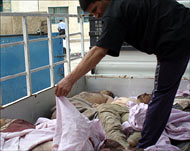Iranian official on landmark Iraq visit
Iranian Foreign Minister Kamal Kharazi has arrived in Iraq on a landmark visit, underlining Tehran’s support to the new government in Baghdad.

Soon after arrival on Tuesday, Kharazi – the highest-ranking Iranian official to visit Iraq since the ouster of Saddam Hussein – assured that Iran would not interfere in the neighbour’s affairs.
“Iraqis are in charge of their own affairs … . Any interference would be an insult to the Iraqi people,” Kharazi said.
The Iranian minister arrived on a day when separate attacks in Iraq killed four Iraqi soldiers and two senior state employees, and three Muslim clerics were assassinated.
“Iran is absolutely ready to cooperate with Iraq in all fields, the economy as well as all other issues of common interest,” Kharazi added.
New optimism
The Iranian official’s optimism was shared by his Iraqi counterpart, Hoshyar Zebari.
“I have no doubt this visit will open up significant new
horizons for cooperation between the two countries,” Zebari said at a joint news conference.
 |
|
The Iranian minister’s visit has |
“Post-Saddam Iraq is a new Iraq, at peace with its neighbours, far removed from its bellicose predecessor,” he said.
“We must break with the past and open a new page, build better relations in all fields based on mutual respect and non-interference,” Zebari added.
Kharazi’s visit, just two days after that of US Secretary of
State Condoleezza Rice, highlights the warming of ties between the two neighbours and their attempt to normalise relations.
Relations between Shia majority Iran and the interim
government set up by the US in June 2004, just over a year after a US-led invasion ousted Saddam Hussein, were uneven.
But the new Shia-dominated government, many of whose ministers spent many years in exile in Tehran and have close ties with Iran, an arch-foe of Washington, has helped ease relations.
Issues unresolved
Baghdad and Tehran re-established diplomatic ties last
September, although many issues are still unresolved from their devastating 1980-1988 war which left one million dead.
|
“The Iranian-Iraqi talks would have covered patrolling the borders, mutual economic issues, and the case of Iranians visiting Iraq illegally” Mashaa Allah Shams al-Waidhin,Iranian journalist |
Iranian journalist Mashaa Allah Shams al-Waidhin said Kharazi’s visit would add momentum to the dialogue between the two countries.
Speaking to Aljazeera, al-Waidhin said Iran and Iraq are likely to seek a resolution to outstanding issues.
“The Iranian-Iraqi talks would have covered patrolling the borders, mutual economic issues, and the case of Iranians visiting Iraq illegally,” he said.
But even as the two-neighbours attempted to bury past differences and cement ties, there was no let-up in violence across Iraq.
More killings
Anti-government fighters shot and killed three clerics in Baghdad on Tuesday.
Two of the clerics were Shias: Mani Hasan, a member of a leading Shia Islamist party, was killed outside his house, while Muwaffaq Mansur was ambushed in his car by assailants.
 |
|
Iraqi authorities are struggling |
The third, Hasan Nuaimi, a Sunni member of the Association of Muslim Scholars, was also found in Baghdad on Tuesday, a day after the group accused the Iraqi government of practising state terrorism and ignoring the killings of Sunnis.
In Baghdad’s Sadr City neighbourhood, two carloads of armed men killed an Iraqi Defence Ministry employee.
The victim, Sergeant Alwan Jabir Risan, was shot and killed in al-Falah Street in Sadr City, a predominantly Shia area in the eastern part of the capital, police Lieutenant-Colonel Hafidh Mann said.
In another incident, a senior Iraqi anti-corruption official was shot dead in southern Baghdad, an Interior Ministry source said.
Three unknown armed men opened fire at 10am (0600 GMT) on the vehicle of Alaa al-Din Wazir al-Ubaidi, a high-ranking official with Iraq‘s Commission on Public Integrity (CPI), killing him on the spot, the source said.
Al-Qaida’s wing in Iraq also warned the country’s Sunni Arabs to take no part in drafting a new constitution.
Troop withdrawal
In a separate development, the defence minister of Kazakhstan said on Tuesday his country’s troops should be withdrawn from Iraq when their current mandate expires.
|
“Iran is absolutely ready to cooperate with Iraq in all fields, the economy as well as all other issues of common interest”
|
“It’s time to think about stopping the work of our contingent in Iraq,” Defence Minister General Mukhtar Altynbayev was quoted as saying by the Interfax news agency.
The Defence Ministry press service confirmed that Altynbayev had spoken in favour of a pullout during a meeting with army officers, though a spokesman said it was the minister’s “personal opinion”.
Kazakhstan currently has 27 soldiers serving in Iraq, where a contingent was first deployed in August 2003. The unit is charged with clearing mines and providing water to Iraqis.
Kharazi’s visit, just two days after that of US Secretary of State Condoleezza Rice, highlights the warming of ties between the two neighbours and their attempt to normalise relations.